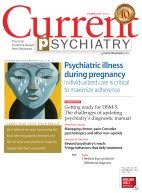Jess G. Fiedorowicz, MD, Assistant professor, Department of psychiatry, University of Iowa, Carver College of Medicine, Iowa City, IA
Donald W. Black, MD, Professor, Department of psychiatry, University of Iowa, Carver College of Medicine, Iowa City, IA
Borderline personality disorder (BPD) and bipolar disorder are frequently confused with each other, in part because of their considerable symptomatic overlap. This redundancy occurs despite the different ways these disorders are conceptualized: BPD as a personality disorder and bipolar disorder as a brain disease among Axis I clinical disorders.
BPD and bipolar disorder—especially bipolar II—often co-occur and are frequently misidentified, as shown by clinical and epidemiologic studies. Misdiagnosis creates problems for clinicians and patients. When diagnosed with BPD, patients with bipolar disorder may be deprived of potentially effective pharmacologic treatments. Conversely, the stigma that BPD carries—particularly in the mental health community—may lead clinicians to:
not even disclose the BPD diagnosis to patients
lean in the direction of diagnosing BPD as bipolar disorder, potentially resulting in treatments that have little relevance or failure to refer for more appropriate psychosocial treatments.
Read full text (free access)
Listen to Dr. Fiedorowicz explains why a thorough and rigorous psychiatric history is essential to distinguish BPD from bipolar disorder
Comment on this article
Email the editor


No comments:
Post a Comment